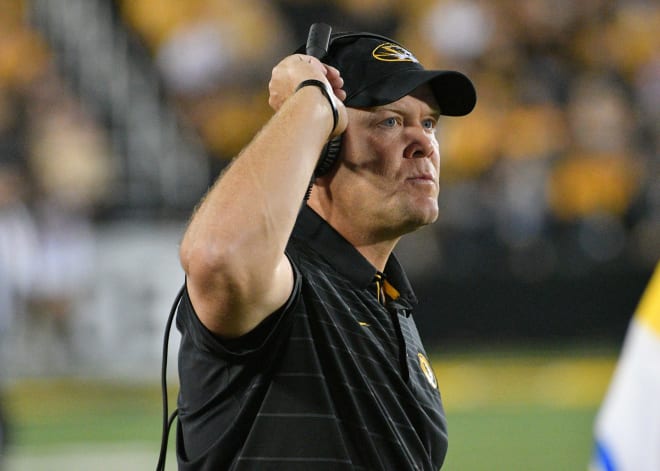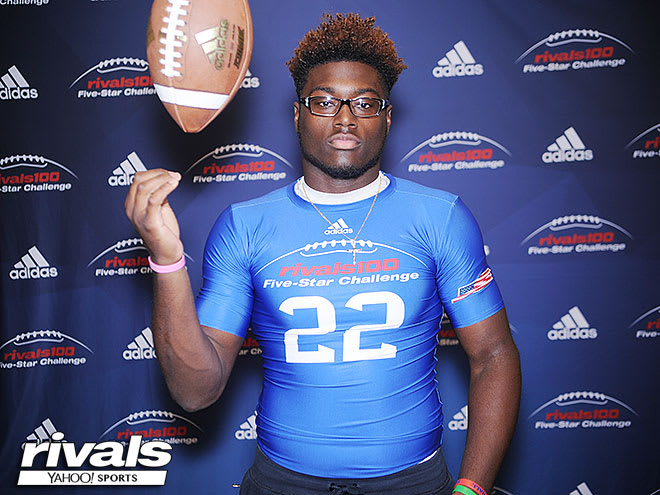Read & React, Vol. 14
By this time next week, we'll be about midway through the early signing period for college football. Every day, someone asks me how the new rule is going to impact recruiting. The only answer is we don't know.
Players don't know. Coaches don't know. Recruiting analysts don't know (anything ever, according to fans). Members of the media don't know (even as much as recruiting analysts). Mizzou won't have a press conference at any point next week. It will announce signings as they occur, but, as a department spokesman told me, you can't really schedule a press conference because you have no idea what's going to happen over those three days. Nobody wants to trot their head coach out there and have two-thirds of his commits choose not to sign, leaving him to talk about six kids and why the hell the other 12 didn't jump on board yet.
It's a whole new world.
RELATED LINKS: MIZZOU COMMIT LIST | VISIT DATES | TEAM RANKINGS

So all we can do is guess. And my guess is that within a year or two, these three days in December will be the National Signing Day that really matters. Forever, the first Wednesday in February has been Christmas Day in the recruiting world. That's going to change.
Right now, there are 226 players verbally committed to SEC schools. That's an average of 16 per school. Every SEC program has at least ten verbal commitments. Kentucky leads the way with 21. Missouri is right in the middle with 17. If you're the head coach at one of these programs, you hope that all 226 of them have signed a National Letter of Intent by next Friday.
Obviously they won't all sign. There are going to be some exceptions. But the simple fact of the matter is any kid who is committed and doesn't sign puts his spot up for grabs for the next six-and-a-half weeks.
Some can do that. If you're an elite prospect, you know most programs are going to have a spot for you in early February. But what if you're a middle-of-the-road three-star (by the way, there's no shame in that, it still means you're one of the top 500-1000 high school seniors in America)? I'd advise you might want to go ahead and lock that spot up. If you don't, you better expect your head coach to go recruit other kids to take your spot. And if he finds one who will, you might find out the school you want to play for doesn't have room for you in February.
Years ago, Rivals.com used to host junior days around the country for some of the top underclassmen. The most important part of these events was when a former college coach would talk to the rising prospects about the recruiting process. He told them to know their strengths. If you're a guy who is going to run a fast 40 and look good in shorts and a t-shirt, go to every camp you can. If you tend to be a better player on Friday nights than you are in drills, avoid the camps. Put your best foot forward and don't accentuate your weaknesses.
The same thing applies here: Know who you are. If you've got 25 (committable) offers, you're going to be fine waiting. If you've got a handful of Power Five offers and you haven't heard from some of those coaches in a few weeks, you might want to go ahead and jump on board while you know for sure you can.

The NCAA likes to say everything it does is for the good of the student-athlete. So my main question is, does the early signing period help the kids? I'm not sure.
First of all, it forces most of them to make a decision sooner. As time goes on, coaches are going to want to have as much of their class as they can locked up in December. They'll spend the time between Christmas and the first Wednesday in February trying to make sure they hit their numbers at ever position and lock down the last five to ten guys on their board. So for a kid in Texas whose state playoffs roll well into December, how many visits can he take? Especially if he doesn't have the finances to tour a bunch of schools on his own dime in the summer. The recruiting process has sped up for kids. The most important decision of their lives so far now has to be made a month-and-a-half sooner.
Perhaps the biggest impact of the early signing day is going to be the coaching carousel. The season ends in late November--or early December if you're in a league title game. Schools who are getting rid of a coach need to do that and get a new guy in as soon as possible. Because if you got hired after about December 7th this year, you've really only got one official visit weekend before the early signing period.
How many kids are you going to lose who used their official visit to that school under the previous coaching staff and now don't really have a chance to get to know the new guy? How many won't be able to take that visit on the one available weekend and will have to push official visits into January and risk losing their spot at a lot of schools? How many have been committed to a coach at his previous school for weeks or months and now have their recruiting process torn up and thrown back to the beginning when that coach leaves for a better job with ten days to figure out what they're going to do?
I guess I'm left wondering, who does this help? Does it help coaches, who now have to move the recruiting process up and prep for bowl games while also trying to sign more than half their class? Not really. If it doesn't help the kids and it doesn't help the coaches, who benefits? I think it benefits the kid who has known forever where he wants to go and has no second thoughts. But that's really about it.
Like I said at the start, we don't really know anything about this. Maybe it will be a raging success, the coaches will love it, the kids will think it's great to have their futures planned two months sooner and everything will go swimmingly (I mean, most things the NCAA does seem to come off without a hitch right?). But I'm not sold on it.
We're six days away from the biggest change in college football recruiting since the advent of the Internet and the reduction in scholarship limits. Like the rest of you, I'm intrigued to see how it changes things. And like the rest of you, I have no idea what to expect.
